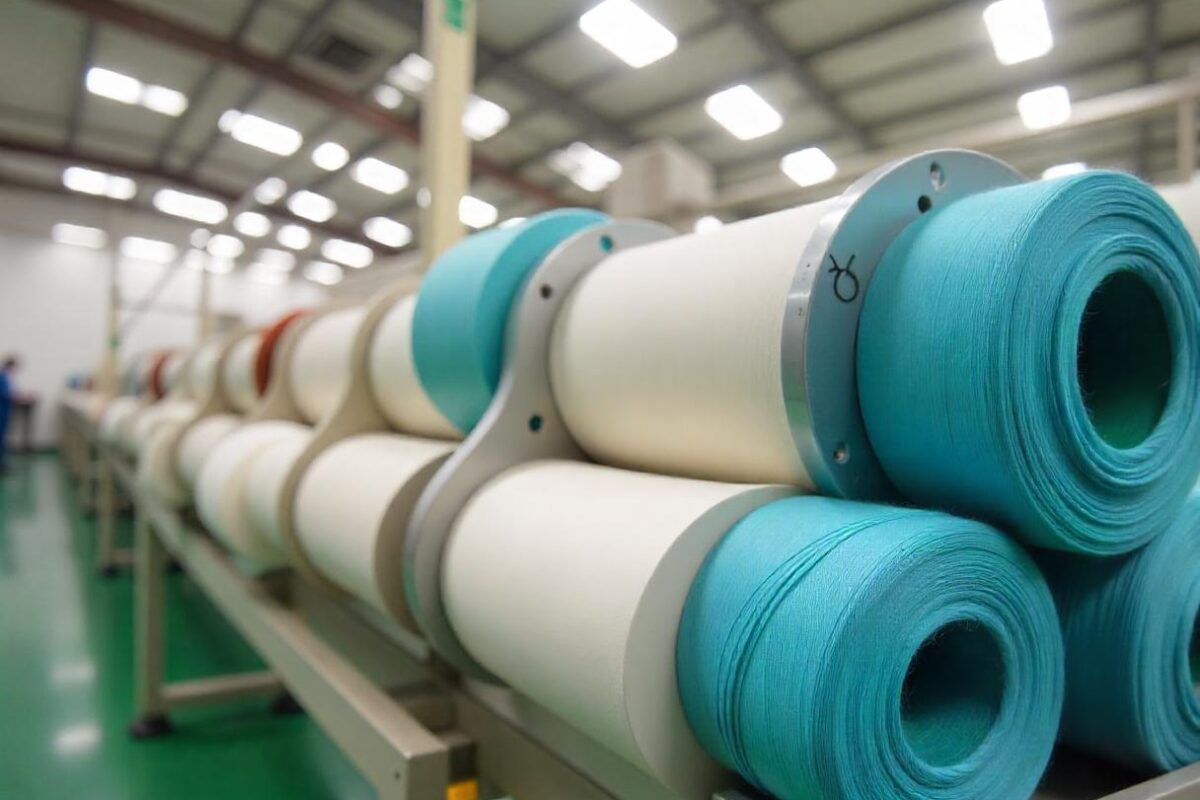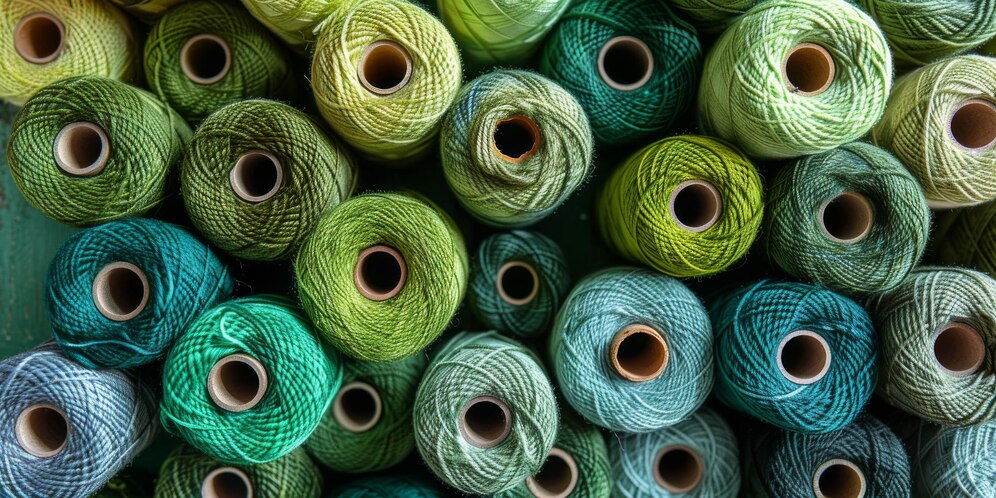In the modern textile industry, sustainability has taken center stage, with Recycled Yarn emerging as a game-changing solution for reducing environmental impact. But while the eco-friendly benefits of recycled yarn are well-known, many manufacturers, retailers, and consumers still have questions about its strength, durability, and overall performance. Can recycled yarn truly stand up to the demands of the textile industry, particularly when used in garments, fabrics, and home textiles?
At KS Spinning Mills, we’ve invested in cutting-edge technology and continuous research to ensure that our 100% recycled cotton-poly blended yarn not only meets but exceeds industry standards for strength and durability. This blog explores the science behind recycled yarn, demonstrating why it’s a strong, durable, and high-performance option for modern textiles.
1. Understanding Recycled Yarn Composition
Recycled yarn is made by repurposing textile waste, such as post-consumer garments or fabric scraps, and blending it with recycled polyester (rPET) derived from plastic bottles. At KS Spinning Mills, our cotton-poly blends are engineered to maintain the optimal balance of natural and synthetic fibers. Cotton offers softness and breathability, while polyester contributes strength, durability, and moisture-wicking properties. This blend creates a versatile yarn suitable for various textile applications, from garments to home textiles.
a. Mechanical Recycling Process
The production of recycled yarn typically involves mechanical recycling, a process that transforms discarded textiles into new fibers. In this process, the textile waste is collected, sorted by material, and mechanically shredded into small fibers. These fibers are then spun into yarn using the same methods used for virgin fibers. Advanced technology ensures that the quality of the resulting yarn remains high, even after multiple recycling cycles.
2. Strength and Durability: How Recycled Yarn Measures Up
One of the common misconceptions about recycled yarn is that it lacks the strength and durability of virgin fibers. However, scientific advancements in yarn manufacturing have proven otherwise. Recycled yarn undergoes rigorous testing to ensure it meets the same performance standards as traditional yarns.
a. Fiber Integrity
During the mechanical recycling process, some fiber degradation occurs, particularly with natural fibers like cotton. However, this is mitigated by blending the recycled cotton with recycled polyester, which enhances the overall strength and durability of the yarn. Polyester, known for its toughness and resistance to wear, helps reinforce the cotton fibers, resulting in a final product that retains the softness of cotton with the added durability of synthetic fibers.
b. Spinning Techniques
Advanced spinning techniques are key to maintaining the strength and integrity of Recycled Yarn. At KS Spinning Mills, we use precision spinning methods that ensure the fibers are tightly bound together, resulting in a yarn that is both strong and consistent. This precision also minimizes the occurrence of weak spots or breaks, ensuring that the yarn performs well under stress, whether in apparel, home textiles, or industrial fabrics.
3. Performance in Textiles: Meeting the Demands of the Industry
Recycled yarn must not only be strong and durable but also perform well in the diverse applications it’s used for. Whether in garments, upholstery, or bed linens, recycled yarn needs to meet the same expectations as its virgin counterparts. Here’s how recycled yarn excels in key performance areas:
a. Moisture Management
One of the standout properties of polyester is its moisture-wicking ability. When blended with recycled cotton, it enhances the fabric’s capacity to pull moisture away from the skin, keeping the wearer dry and comfortable. This makes recycled yarn ideal for activewear, bedding, and other textiles that require breathability and moisture control.
b. Resistance to Wear and Tear
Thanks to the polyester blend, recycled yarn exhibits excellent resistance to abrasion and wear. This means textiles made from recycled yarn are less prone to pilling, tearing, or fraying, even after extended use. For garments and home textiles that are subject to frequent washing and heavy use, this durability is essential. Upholstery fabrics, for example, benefit from the added resilience of recycled yarn, maintaining their integrity over time.
c. Color Retention
Recycled yarn is also highly effective at retaining color, even after repeated washing. The polyester component helps maintain the vibrancy of the dye, ensuring that textiles made from recycled yarn look new for longer. This makes it an attractive option for fashion brands, interior designers, and retailers who want to offer long-lasting, high-quality products.
4. Environmental Impact and Circularity
The environmental benefits of recycled yarn cannot be overstated. Traditional cotton production is water-intensive, and polyester production relies on fossil fuels. By using recycled materials, the textile industry significantly reduces its consumption of water, energy, and raw materials. The recycled polyester used in yarn is derived from post-consumer plastic bottles, giving new life to waste that would otherwise end up in landfills.
Moreover, the production of recycled yarn emits fewer greenhouse gases compared to virgin fiber production, contributing to a lower carbon footprint. This makes it an environmentally responsible choice for manufacturers and brands looking to reduce their ecological impact.
5. Certifications and Quality Assurance
Recycled yarn is rigorously tested to ensure it meets international quality and sustainability standards. At KS Spinning Mills, our recycled yarn undergoes extensive quality control measures to ensure it performs as expected in various textile applications. Certifications like the Global Recycled Standard (GRS) and OEKO-TEX® provide additional assurance that our yarn is not only high-quality but also produced in an environmentally and socially responsible manner.
Conclusion: Recycled Yarn—A High-Performance, Sustainable Choice
The science behind recycled yarn is clear: it is a strong, durable, and high-performing material that meets the demands of the modern textile industry. At KS Spinning Mills, we are committed to pushing the boundaries of recycled yarn technology, ensuring that our cotton-poly blended yarn delivers the same level of performance as traditional yarn while offering significant environmental benefits.
By choosing recycled yarn, manufacturers, retailers, and consumers can enjoy the best of both worlds—high-quality textiles that perform well and contribute to a more sustainable future. As the demand for eco-friendly products continues to grow, Recycled Yarn will play a crucial role in shaping the textiles of tomorrow.
Join us in embracing the power of recycled yarn and revolutionizing the way we think about strength, durability, and performance in textiles.




